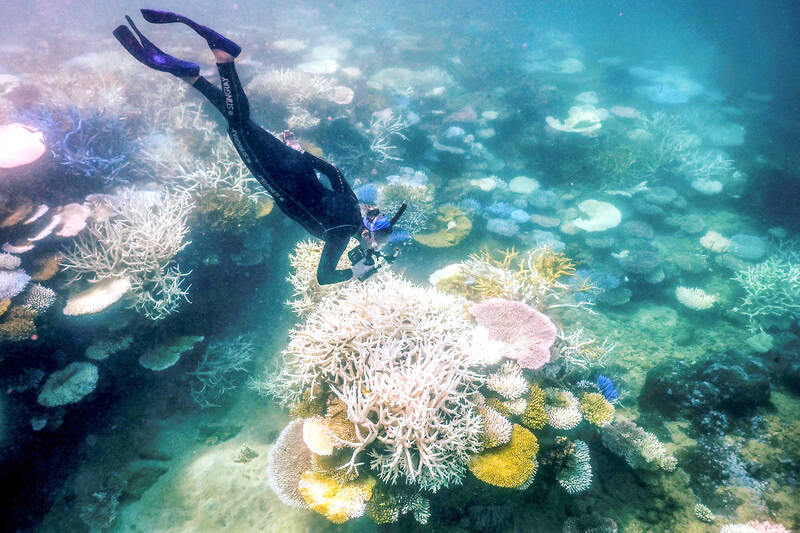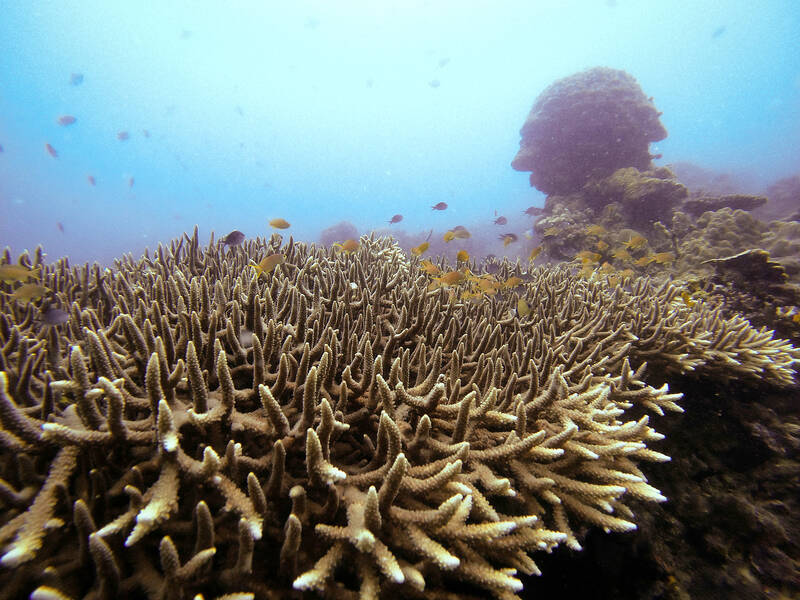Huge stretches of coral reef around the world are turning a ghostly white this year amid record warm ocean temperatures.
On April 15, the US National Oceanic and Atmospheric Administration confirmed the world’s fourth mass global bleaching event is underway — with serious consequences for marine life and for the people and economies that rely on reefs.
WHAT ARE CORALS?

Photo: AFP 照片:法新社
Corals are invertebrates that live in colonies. Their calcium carbonate secretions form hard and protective scaffolding that serves as a home to many colorful species of single-celled algae.
The two organisms have evolved over millennia to work together, with corals providing shelter to algae, while the algae remove coral waste compounds and deliver energy and oxygen back to their hosts.
WHY DO CORALS MATTER?

Photo: Reuters 照片:路透
Coral reefs cover less than one percent of the ocean floor, but have out-sized benefits for marine ecosystems and economies.
A quarter of marine life will depend on reefs for shelter, finding food or spawning at some point in their lives and coastal fisheries would struggle without corals.
Every year, reefs provide about US$2.7 trillion in goods and services, from tourism to coastal protection, a 2020 estimate by the Global Coral Reef Monitoring Network showed. About US$36 billion is generated by snorkeling and scuba diving tourists alone.
Coral reefs also help coastal communities by forming a protective barrier against storm surges and large waves. This helps to avoid property damage for more than 5 million people worldwide, a 2022 study in the journal Marine Policy found.
WHAT IS CORAL BLEACHING?
When water temperatures rise, jewel-toned corals get stressed. They cope by expelling their algae — causing them to turn bone white.
Most corals live in shallow waters, where climate-driven warming is most pronounced.
Whether a coral becomes heat-stressed depends on how long the high temperatures last, and how much warmer they are than usual.
Scientists have found that corals generally begin to bleach when surrounding waters are at least 1 degree Celsius warmer than the maximum average temperature — or the peak of what corals are used to — and persist for four or more weeks.
DO ALL BLEACHED CORALS DIE?
Corals can survive a bleaching event if the surrounding waters cool and algae return.
Dead reefs can still offer shelter to fish or provide a storm barrier over several years for coastal communities.
But eventually, these underwater graveyards of calcium carbonate skeletons will erode and break apart.
WHAT CAN BE DONE TO HELP SAVE REEFS?
The best chance for coral survival is for the world to cut greenhouse gas emissions to limit climate change.
Many scientists think that at just 1.2C of warming above preindustrial level, the world has already passed a key threshold for coral reef survival. They expect between 70% and 90% of the world’s coral reefs will be lost.
Scientists and conservationists are scrambling to intervene.
Local communities have cleanup program to remove litter from the reefs to reduce further stresses. Scientists are breeding corals in labs with the hopes of restoring degraded reefs.
However, none of this is likely to work to protect today’s corals from warming waters. Scientists are therefore trying to plan for the future by bringing coral larvae into cryopreservation banks, and breeding corals with more resilient traits.
(Reuters)
在今年創紀錄的海洋高溫下,世界各地大片珊瑚礁正變成幽靈般的白色。
美國國家海洋暨大氣總署4月15日證實,全球正經歷第四次大規模珊瑚白化,將嚴重影響海洋生物以及仰賴珊瑚礁的人民與經濟。
珊瑚是什麼?
珊瑚是群居的無脊椎動物,它們所分泌的碳酸鈣形成堅硬的保護性支架,是許多色彩繽紛的單細胞藻類的家。
這兩種生物已進化了數千年,可以互相合作,珊瑚為藻類提供棲身之處,而藻類則清除珊瑚所排出的化合廢物,並將能量及氧氣輸送回宿主。
珊瑚為何重要?
珊瑚礁只佔海床的不到百分之一,但對海洋生態系和經濟有莫大助益。
四分之一的海洋生物仰賴珊瑚礁做為棲身處、覓食或產卵,如果沒有珊瑚,沿海漁業將陷入困境。
根據全球珊瑚礁監測網2020年的估計,珊瑚礁每年提供約2.7兆美元的商品和服務,範圍從旅遊業到海岸保護。光是浮潛和水肺潛水遊客就創造了約360億美元的收入。
珊瑚礁還可成為抵禦暴潮和巨浪的保護屏障,幫助沿海居民。《海洋政策》期刊2022年的一項研究發現,這有助於避免全球逾500萬人遭受財產損失。
什麼是珊瑚白化?
水溫升高時,寶石色的珊瑚就會感到不適,其應對方式便是驅逐藻類——這導致珊瑚變成骨頭般的白色。
大多數珊瑚生活在淺海中,而氣候所導致的暖化在淺海最為顯著。
珊瑚是否會因熱而感到壓力,取決於高溫所持續的時間,以及比平常溫暖多少。
科學家發現,當珊瑚周圍水域溫度比最高平均溫度(或珊瑚習慣的最高溫度)高攝氏1度以上時,珊瑚通常就會開始白化,並持續四週或更長時間。
所有白化的珊瑚都會死亡嗎?
如果珊瑚周圍海水變冷,且藻類回歸,珊瑚就可以在白化事件中倖存下來。
死亡的珊瑚礁仍可以為魚類提供庇護,或繼續為沿海居民屏障風暴達數年。
但最終,這些碳酸鈣骨骼的水下墓地將被侵蝕和分解。
拯救珊瑚礁可採取何措施?
讓珊瑚存活的最佳做法,是世界減少溫室氣體排放以限制氣候變化。
許多科學家認為,全球暖化僅比工業化前水平高攝氏1.2度,就已超過了珊瑚礁生存的關鍵門檻。他們預計世界上70%到90%的珊瑚礁將會消失。
科學家和自然資源保護主義者正紛紛介入。
在地居民制定了清理計畫,清除珊瑚礁上的垃圾,以免珊瑚礁遭受更多壓力。科學家正在實驗室培育珊瑚,希望能讓退化的珊瑚礁恢復原貌。
然而,這些都無法保護現今的珊瑚免受海水暖化的影響。因此,科學家正試圖未雨綢繆,將珊瑚幼蟲放入低溫保存庫,並培育具更強復原力的珊瑚。
(台北時報林俐凱編譯)

A: China’s animated blockbuster “Ne Zha 2” also smashed a box office record recently. B: It’s No. 7 among the world’s best-selling films, grossing more than US$2 billion globally. A: I t has even become the world’s highest-grossing animated film, while the political metaphors in it are causing controversy. B: But who is Ne Zha anyway? A: Ne Zha, often spelled as “Nezha,” is actually a mythical teenage deity with superpowers. A: 中國動畫片《哪吒2》最近也打破紀錄。 B: 該片已衝上影史票房排行榜第7名,全球狂賣超過20億美元。 A: 聽說它甚至是全球最賣座的動畫片,影片中的政治隱喻卻引爆爭議! B: 但哪吒是誰? A: 哪吒的名字常被拼成「Nezha」,是神話中具有超能力的青少年神明。

You enter an old-fashioned detective’s office. The door locks with a click as a radio buzzes: “Rookie detectives, a priceless diamond is missing! Solve the case in one hour.” The room is filled with clues — photographs, coded messages and secret compartments. As the grandfather clock ticks, you and your friends must work to unlock the secrets. This is what escape rooms are all about — immersive adventure games where you solve puzzles and escape the themed setting within a time limit. The concept of “escape rooms” dates back to early first-person video games. In 1988, John Wilson introduced

People desire a sense of purpose in their lives, but they often remain idle unless they have a clear reason to act. This concept is illustrated by the retirement paradox. People work hard to prepare for a future without work but find life meaningless after achieving that goal. A study was carried out to determine if a reason, even a minor one, could encourage idle people to take action. __1__ Upon finishing the first, they were instructed to drop it off at a location either right outside the room or at a spot farther away, which would take around

A: Were there any highlights at the Oscars this year? B: With 13 nods, French director Jacques Audiard’s “Emilia Perez” broke the record for most Oscar nominations earned by a non-English film. A: Wow, it broke the record of 10 Oscar nominations set by Taiwanese director Ang Lee’s “Crouching Tiger, Hidden Dragon.” B: On the eve of the Oscars, Lee was honored with the Lifetime Achievement Award at the Directors Guild of America (DGA) Awards. A: It seems that Hollywood has finally become more diverse. A: 今年的奧斯卡獎有什麼亮點嗎? B: 法國導演賈克歐迪亞的《璀璨女人夢》榮獲13項提名,打破了非英語片紀錄! A: 哇打破了台灣導演李安的《臥虎藏龍》10項提名紀錄。 B: 李安則在奧斯卡前夕,獲頒美國導演工會「終身成就獎」。 A: 看來好萊塢終於比較多元化啦。 (By Eddy Chang, Taipei Times/台北時報張迪)